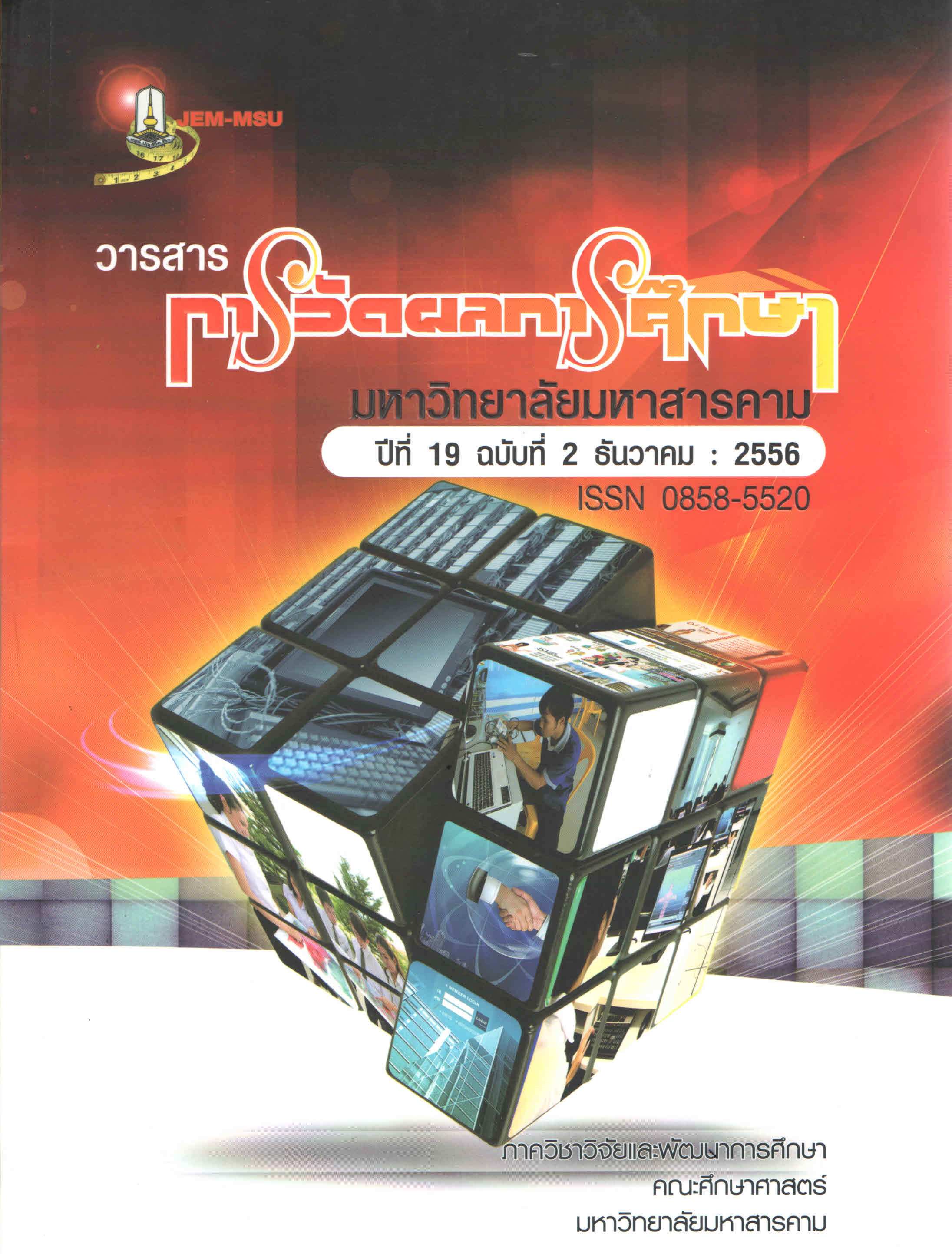Construction of Experimental Performance Measuring Instruments Instruments in the Science Learning Strand for Mattayomsueksa 3 : Energy
Main Article Content
Abstract
Authentic measurement and evaluation are useful and appropriate measurement which
should be really used at school. A performance measurement is an authentic measurement
which can help evaluate students real knowledge, ability, and feelings. The purposes of this
study were to Construction of Experimental Performance Measuring Instruments Instruments in
the Science Learning Strand for Mattayomsueksa 3 : Energy, and to find out the quality of
the researcher–constructed performance measuring instruments Comprising 2 typers : 4
performance observation forms and 4 tests of knowledge and ability in the science learning
strand. The sample was consisted of 568 Matthayomsuksa 3 students, studying under the
Office of Si Sa Ket Education Service Area 3 in the Second semester of the academic year
2010, obtained using the multi-stage random sampling technique : samples consisted of
132 in experimented 1, samples consisted of 166 in experimented 2 to determine the
discriminative power of 4 performance. And to determine difficulty for each item of knowledge
and ability in the science learning strand. And samples consisted of 270 in experimented
3 to reliability total of Experimental Performance Measuring Instruments Instruments in the
Science Learning Strand, and tests of knowledge and ability in the science learning strand.
The statistics used for analyzing the collected data were mean, standard deviation
The research findings were as follows :
Experimental 1 Performance Measuring Instruments Instruments in the Science
Learning ; No.1 has 10 questions Discriminating powers of a Scale with the values, ranging
0.235 to 0.670, No.2 has 10 questions Discriminating powers of a Scale with the values, ranging
0.225 to 0.575, No.3 has 10 questions Discriminating powers of a Scale with the values, ranging
0.240 to 0.700, No.4 has 10 questions Discriminating powers of a Scale with the values,
ranging 0.250 to 0.513, And tests of knowledge and ability in the science learning strand
difficulty of a Scale with the values, ranging 0.210 to 0.790 and Discriminating powers of a
Scale with the values, ranging 0.210 to 0.680
Experimental 2 Performance Measuring Instruments Instruments in the Science
Learning ; No.1 has 10 questions Discriminating powers of a Scale with the values, ranging 0.200
to 0.575, No.2 has 10 questions Discriminating powers of a Scale with the values, ranging 0.225
to 0.500, No.3 has 10 questions Discriminating powers of a Scale with the values, ranging 0.213 to
0.950, No.4 has 10 questions Discriminating powers of a Scale with the values, ranging 0.238 to
0.563, And tests of knowledge and ability in the science learning strand difficulty of a Scale
with the values, ranging 0.230 to 0.790 and Discriminating powers of a Scale with the values,
ranging 0.200 to 0.780
Experimental 3 Performance Measuring Instruments Instruments in the Science
Learning ; No.1 has 10 questions Discriminating powers of a Scale with the values, ranging 0.375
to 0.675, No.2 has 10 questions Discriminating powers of a Scale with the values, ranging 0.295
to 0.675, No.3 has 10 questions Discriminating powers of a Scale with the values, ranging
0.200 to 0.575, No.4 has 10 questions Discriminating powers of a Scale with the values, ranging
0.280 to 0.763 , And tests of knowledge and ability in the science learning strand difficulty
of a Scale ; The average 21.42 ( X =21.42) standard deviation is 6.92 (S = 6.92) overall reliability
of 0.82 (RCC) standard error ofmeasurement is 2.93 On conclusion, experimental performance
measuring instruments in the Science learning strand, had a required – standard quality and could
be implemented in measuringexperimental performance in the science learning strand at the
Mattayomsueksa 3 level.
Article Details
The content and information contained in the published article in the Journal of Educational Measurement Mahasarakham University represent the opinions and responsibilities of the authors directly. The editorial board of the journal is not necessarily in agreement with or responsible for any of the content.
The articles, data, content, images, etc. that have been published in the Journal of Educational Measurement Mahasarakham University are copyrighted by the journal. If any individual or organization wishes to reproduce or perform any actions involving the entirety or any part of the content, they must obtain written permission from the Journal of Educational Measurement Mahasarakham University.


